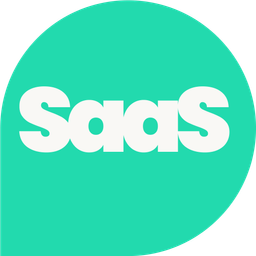The SaaS world is highly competitive, with many companies seeking top talent. However, don't count yourself out just because you lack extensive tech experience. The SaaS industry thrives on a diverse ecosystem of skills, requiring expertise from various disciplines to keep an organization running smoothly.
Think of the numerous roles within an average company, from marketing and sales to customer success. Sales, in particular, stands out. You might assume that selling SaaS products demands tech savviness, but the essential factor is often the human touch. Even without experience selling software, you might have the qualities needed to build trust and convert leads into customers.
That said, the industry remains challenging. Let's explore some steps to give you a competitive edge.
What is SaaS sales?
SaaS sales, or Software as a Service sales, is the process of selling cloud-based software subscriptions. Unlike traditional software sales, where you buy a license and install the software yourself, SaaS products are hosted remotely and accessed via the internet. The subscription model offers recurring revenue, and scalability options let customers start small and expand as needed.
To retain customers, SaaS companies emphasize customer success, providing support, onboarding help, and feature updates. Free trials and freemium models let potential customers test the waters before committing.
The sales cycle can range from quick and simple to extensive demos and negotiations, depending on the product's complexity and customer needs.

What kind of experience do you need to get started in SaaS sales?
While experience in selling software can be useful, interviewers are primarily interested in whether you have experience selling to specific markets, understanding their pain points, and ensuring your company's message resonates with the right prospects. Industry knowledge is also essential.
Know the current challenges and how the company you're applying to is addressing or missing these needs. Fresh insights into strategies can set you apart from more seasoned salespeople.
Additionally, experience hitting rigorous targets is valuable, as sales is often a high-pressure field. Demonstrating past success in meeting demands, regardless of industry, will leave a strong impression.

What training do you need to succeed in SaaS sales?
There are fortunately many accredited sales training courses out there, such as those of our sister community sales enablement collective. Although these courses can’t ever be a substitute for real on the ground experience, you’ll get to learn from the cream of the crop, and it’ll get you familiar with the fundamentals of SaaS sales.
When you start applying for jobs, evidence of putting the effort in to learn these fundamental skills will go a long way.
Proactive steps to get into SaaS sales
Great, so we’ve defined what SaaS sales is and what you need, broadly, to get there. Now let’s get into what proactive steps you need to take to get your foot in the door.
Establish your goals
It might seem like you’re putting the cart before the horse a little, but it can be difficult to embark on any journey if you don’t know what your ultimate goal is. You can only plan out your path when you know what your first step needs to be. Each step is going to require real determination, so you need to know exactly what moves you need to make.
Bonus: Get in to customer support role
Customer support roles can be great for getting your foot in the door. Customer support specialists need to learn a bit about the product, and tech products in general in order to be abole to assist customers or refer them to the right department.
And if you haven’t had much experience handling more challenging customers, this can be a great way to cut your teeth. It’s all about cultivating those skills that are essential for a successful sales rep.
Get the full low-down on the SaaS industry
Becoming an expert on the SaaS industry is like becoming an expert on everything. Yeah, doesn’t really exist. There are a whole plethora of SaaS categories out there, so before you get started on your journey, it’s important to establish what kind of SaaS product you want to be selling.
Then you need to conduct thorough market research into the kind of people who are going to be looking to buy the product, what are their pain points, what mode of communication do they prefer?
If you come to your first interview armed with this information, you're already going to have some solutions for the challenges they face.
Find the type of SaaS company that suits you
Finding the right SaaS company to work for can be challenging, with so many options available. Here are some key factors to consider when searching for a good fit:
- Company size: Determine if you prefer working for a smaller start-up or a larger, established company.
- Growth stage: Consider whether the company is in the early stages of growth or is scaling up.
- Culture: Look into the company's work culture to see if it aligns with your values and working style.
- Product: Ensure you're interested in the company's product and its potential.
Once you've identified a few companies that match these criteria, reach out to them directly to inquire about opportunities in their sales department. If no openings are available, don't be discouraged. Contact their HR department to see if they can point you to similar opportunities elsewhere.
Make a list of your skills
Even if you don’t have any experience working in software technology, the SaaS landscape is diverse enough that you probably already have skills that could massively benefit any SaaS company.
So once you’ve decided what kind of SaaS company you want to apply for you then need to think of what sills are going to be needed, how they mesh with the skills you already have, which skills you can realistically acquire, and which are going to take a little longer.
There is no one size fits all, but in general SaaS hiring managers are going to be looking for the following qualities:
A team player: A good SaaS company fosters cross-functional collaboration, so you’ll need to show you have a willingness to make your work fit into the overall picture of the SaaS company.
A great negotiator: It’s an indispensable skill in sales, so come to your interview with evidence of how you’ve been able to either win customers over, or alternatively, manage customer expectations.
A tough cookie: In sales, you’re often going to take the heat of disgruntled customers, so you’ll need to demonstrate that you can handle this criticism without taking it personally.
An eager beaver: You can prove your enthusiasm by conducting adequate research into the company you want to be a part of. And that goes beyond simply knowing the product. You should be aware of the company’s mission statement and values.

Write a kick ass resume
Writing a resume for a tech job can seem daunting, but breaking it down into key steps can make it easier. Here's a more conversational guide to crafting a tech-focused resume:
- Do your homework: Start by researching the company and the specific role you're applying for. Get a sense of their mission, culture, and what skills and qualifications they value.
- Customize your resume: Tailor your resume to the job in question. Highlight skills, experiences, and achievements that directly align with the job description and the company's needs.
- Tech skills: Make sure to list all your relevant technical skills clearly. Include programming languages, software tools, and frameworks you’re proficient in.
- Work experience: Outline your professional experience, focusing on tech roles and projects. Highlight key achievements, quantify them if possible, and mention any projects you've led or contributed to.
- Education and certifications: Include your educational background, especially if it's related to tech. Mention relevant degrees, courses, and certifications that apply to the role.
- Projects and portfolio: If you've worked on tech projects outside your job, include them too. This could be open-source contributions, freelance projects, or personal endeavors.
- Soft skills: Don't forget to mention soft skills that are valuable in tech, like problem-solving, teamwork, and communication. You can emphasize these in both your skills section and when describing your experience.
- Keep it clean: Make sure your resume is clear and concise, ideally one or two pages. Use bullet points, consistent formatting, and a clean design to make it easy to read.
- Proofread: Finally, thoroughly review your resume for typos and grammatical errors. It’s a good idea to get a friend or colleague to look it over as well.
Wrapping up
An important thing to bear in mind is that SaaS companies benefit from a diverse pool of talent. Think the world of SaaS is just for the SIlicon Valley tech wiz. Think again? You need your customer success specialists, your marketing maestros, and your visual artists, just to name a few.
So find how your skills fit into the tech ecosystem and get started today.
Like what you see? Our exclusive content is even better. Dive into top notch insights from the leading minds in SaaS right here.



